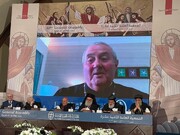Hawzah News Agency – As moderator George Vlantis, associate of the Volos Academy and director of the Council of Churches of Bavaria (Germany and Greece), said: "The challenge is the definition of our relationship of the Orthodox to ‘the other.’’’
With topics ranging from space to spirituality, from Christian unity to the upcoming WCC 11th Assembly, the speakers presented formal reflections, then answered questions from the online audience that spilled over the allotted time.
Archbishop Job of Telmessos, permanent representative of the Ecumenical Patriarchate in the WCC, reflected that dialogue is not monologue because genuine dialogue involves listening to ‘the other’—and such dialogue is nurtured and convened by the WCC.
He lamented that, too often, Orthodox churches give the perception of not caring about “the other.”
He said: “In fact, very often, this can be said about local autocephalous churches even on an intra-Orthodox level,” he said. “That was already a danger in the 20th century and the remedy to this was the World Council of Churches.”
Dr Razvan Porumb, lecturer at the Institute of Orthodox Studies, Cambridge University, said he appreciated the genuineness not only of the discussion but also of relationships built, in the past and in the future, that work toward Christian unity. "I know that the presupposition is that the Orthodox church is the one true church—even for those who enter into participation with other ecumenical partners,” he said. “I think, though, perhaps we could be a little more humble about this claim."
The speakers reflected on the crucial role of dialogue in the context of the war in Ukraine, the COVID-19 pandemic and other global challenges, noting that it has become clear, particularly in the last few years, how essential such a dialogue is in the Christian world.
They noted that, when such dialogue is discontinued, shunned or neglected, it leads churches into a state of protecting themselves at the expense of relating to others and then, in order to be a defender, then a church constantly needs an adversary.
Dr Kateřina Kočandrle Bauer, researcher and lecturer at the Ecumenical Institute of the Protestant Theological School of Charles University in Prague, spoke on the importance of Orthodox participation in the upcoming WCC 11th Assembly, and particularly on the deep resonance of the assembly theme “Christ’s love moves the world to reconciliation and unity.”
The assembly theme is very fruitful “because it speaks firstly about the source of love, which is Christ, and secondly about reconciliation which is part of the condition for unity.”
She further noted that the theme avoids the parts of unity that are dangerous because they involve force. “The real unity is based on the relationship of recognition and acceptance,” she said.



Your Comment